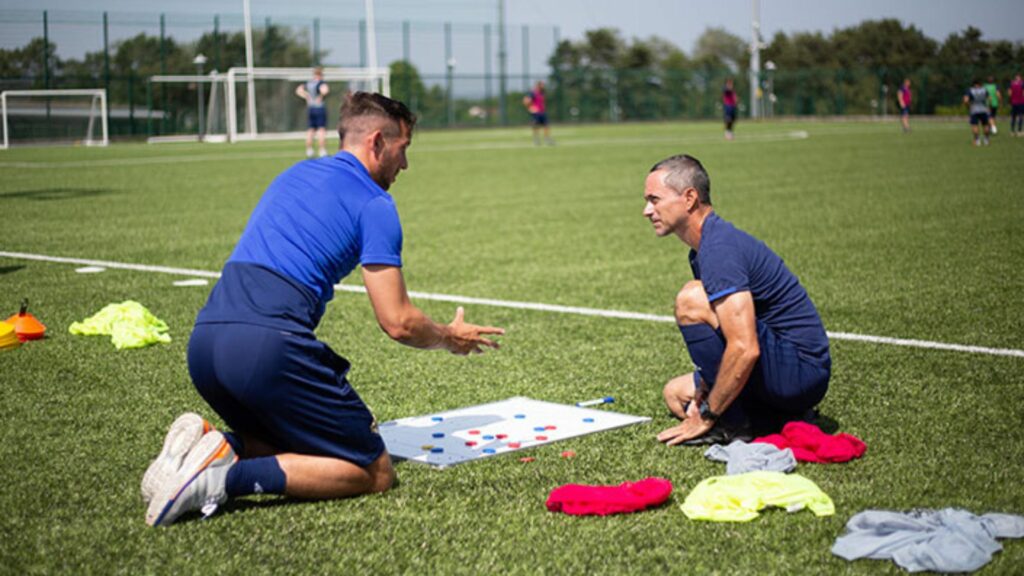“Football Coaching Strategies in Mexico
Related Articles Football Coaching Strategies in Mexico
Football Coaching Strategies in Mexico

Mexico, a country steeped in footballing tradition and passion, has long been a prominent figure in the global football landscape. From its vibrant fan base to its historic performances in international competitions, Mexico’s love for the beautiful game is undeniable. Behind the scenes, a dedicated cohort of football coaches plays a crucial role in shaping the nation’s footballing identity and nurturing the talents of aspiring players. This article delves into the intricate world of football coaching strategies in Mexico, exploring the key philosophies, methodologies, and challenges that define the profession.
Historical Overview of Football Coaching in Mexico
The history of football coaching in Mexico is intertwined with the evolution of the sport itself. In the early days, coaching was often informal, with experienced players or enthusiasts taking on the role of guiding teams. As the sport gained popularity and became more professionalized, the need for structured coaching education and formalized strategies grew.
In the mid-20th century, foreign coaches, particularly from Europe and South America, played a significant role in shaping Mexican football. These coaches brought with them new ideas, tactics, and training methods, which gradually influenced the development of local coaching philosophies. Over time, Mexican coaches began to emerge, blending foreign influences with their understanding of the local footballing culture.
Key Coaching Philosophies in Mexico
Mexican football coaching philosophies are diverse, reflecting the country’s rich footballing heritage and the evolving nature of the sport. However, some common themes and approaches can be identified:
-
Emphasis on Technical Skills: Mexican coaches place a strong emphasis on developing the technical skills of their players. This includes ball control, passing accuracy, dribbling ability, and shooting technique. The focus on technical proficiency is rooted in the belief that players with strong technical foundations are better equipped to execute tactical plans and adapt to different game situations.
-
Tactical Flexibility: Mexican coaches often prioritize tactical flexibility, aiming to develop players who can adapt to different formations, systems, and game scenarios. This emphasis on versatility allows teams to adjust their approach based on the strengths and weaknesses of their opponents, as well as the specific circumstances of the match.
-
Attacking Football: Mexican football has a long-standing tradition of attacking football, with a focus on creating scoring opportunities and entertaining the fans. Coaches often encourage their teams to play with attacking flair, creativity, and a willingness to take risks in the final third of the field.

-
Development of Youth Players: Mexican coaches recognize the importance of developing young players and providing them with opportunities to progress through the ranks. Youth academies and development programs are seen as crucial for nurturing the next generation of talent and ensuring the long-term success of Mexican football.
Coaching Methodologies in Mexico
Mexican football coaches employ a variety of coaching methodologies to implement their philosophies and develop their players. Some common approaches include:
-
Small-Sided Games: Small-sided games are widely used in Mexican football training to improve technical skills, tactical awareness, and decision-making. These games involve smaller teams playing on reduced-size pitches, which encourages players to make quick decisions, adapt to tight spaces, and develop their individual skills.
-
Positional Play: Positional play, also known as "juego de posición," is a tactical approach that emphasizes maintaining possession of the ball while creating passing lanes and exploiting spaces on the field. Mexican coaches often incorporate positional play principles into their training sessions to improve their team’s ability to control the game and create scoring opportunities.
-
Video Analysis: Video analysis has become an increasingly important tool for Mexican coaches, allowing them to evaluate player performance, identify tactical patterns, and prepare for upcoming matches. Coaches use video analysis to provide players with feedback, highlight areas for improvement, and develop game plans based on the strengths and weaknesses of their opponents.
-
Physical Conditioning: Physical conditioning is an integral part of Mexican football training, with coaches focusing on developing players’ endurance, strength, speed, and agility. Training programs often include a combination of cardiovascular exercises, strength training, and plyometrics to improve players’ overall fitness and reduce the risk of injuries.
Challenges Faced by Football Coaches in Mexico
Despite the passion and dedication of Mexican football coaches, they face a number of challenges in their profession:
-
Limited Resources: Many Mexican football clubs, particularly those outside of the top divisions, operate with limited resources. This can affect the quality of training facilities, equipment, and coaching staff, making it difficult for coaches to implement their strategies effectively.
-
Lack of Formal Education: While coaching education programs are becoming more prevalent in Mexico, there is still a shortage of formally trained coaches, particularly at the grassroots level. This can lead to inconsistencies in coaching quality and a lack of standardized training methodologies.
-
Cultural Barriers: Cultural barriers, such as language differences and varying levels of education, can pose challenges for coaches working with diverse groups of players. Coaches need to be sensitive to these cultural differences and adapt their communication style to ensure that their message is understood by all players.
-
Pressure to Win: The pressure to win is intense in Mexican football, with coaches often facing scrutiny from fans, media, and club owners. This pressure can lead to short-term decision-making and a reluctance to take risks, which can stifle creativity and innovation.
Notable Mexican Football Coaches
Despite the challenges, Mexican football has produced a number of notable coaches who have achieved success at both the club and international levels. Some of the most prominent figures include:
-
Javier Aguirre: Aguirre has managed several top Mexican clubs, as well as the Mexican national team on multiple occasions. He is known for his tactical acumen, motivational skills, and ability to build strong team spirit.
-
Ricardo Ferretti: Ferretti, also known as "Tuca," is one of the most successful coaches in Mexican football history. He has won multiple league titles with different clubs and is known for his pragmatic approach and emphasis on defensive stability.
-
Miguel Herrera: Herrera is known for his passionate and fiery personality, as well as his attacking style of play. He has managed several top Mexican clubs and led the Mexican national team to the 2014 FIFA World Cup.
-
Victor Manuel Vucetich: Vucetich is one of the most experienced and respected coaches in Mexican football. He has won multiple league titles with different clubs and is known for his tactical flexibility and ability to adapt to different situations.
The Future of Football Coaching in Mexico
The future of football coaching in Mexico is bright, with a growing emphasis on coaching education, youth development, and the adoption of modern training methodologies. As Mexican football continues to evolve, coaches will play an increasingly important role in shaping the nation’s footballing identity and nurturing the talents of aspiring players.
In conclusion, football coaching in Mexico is a complex and multifaceted profession, shaped by the country’s rich footballing heritage, evolving coaching philosophies, and unique challenges. By embracing modern training methodologies, investing in coaching education, and nurturing the talents of young players, Mexican football coaches can continue to play a vital role in the success of the nation’s footballing future.

